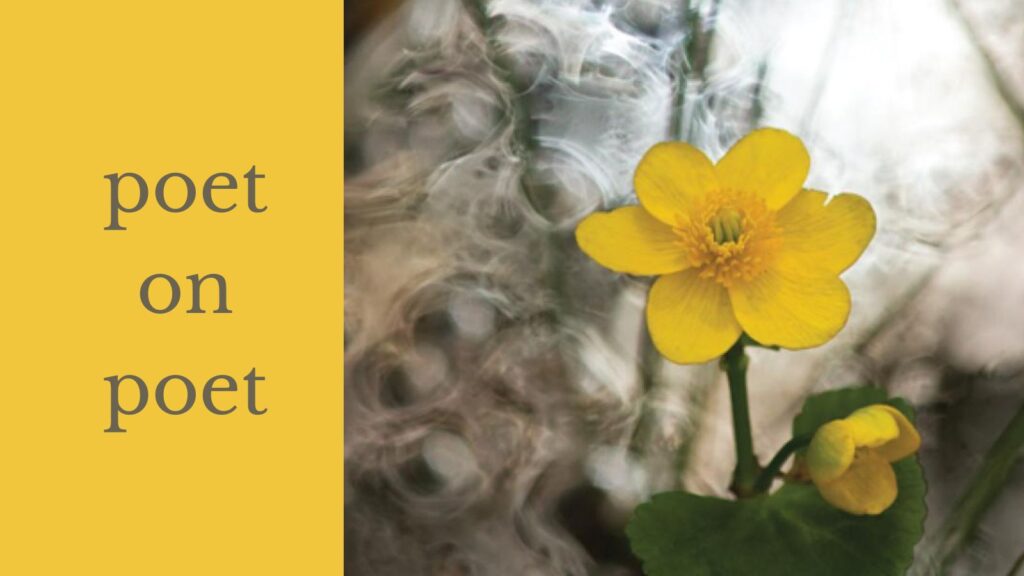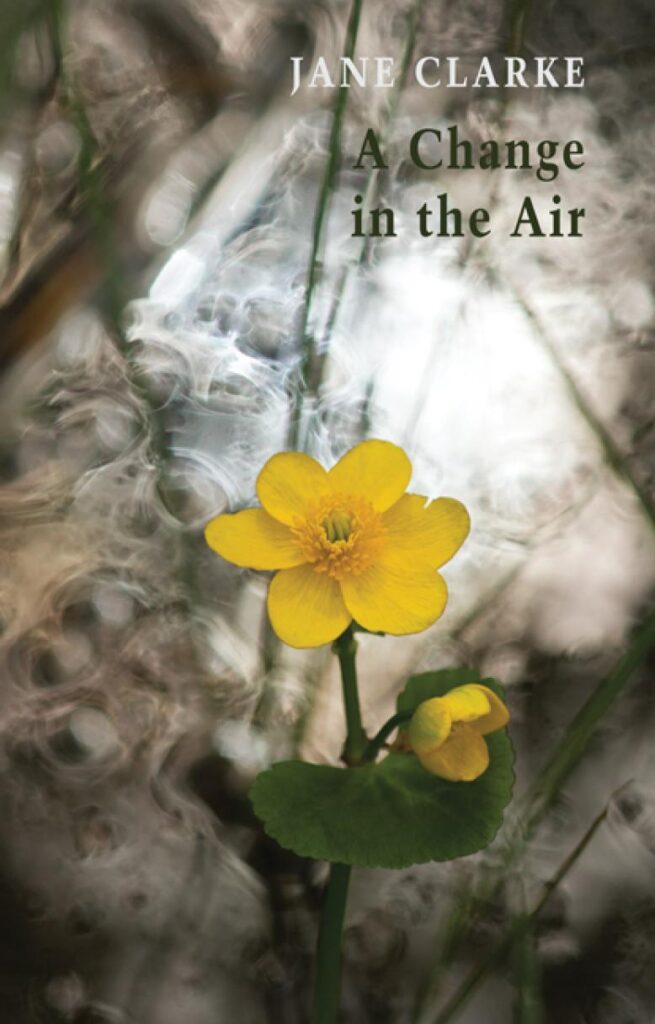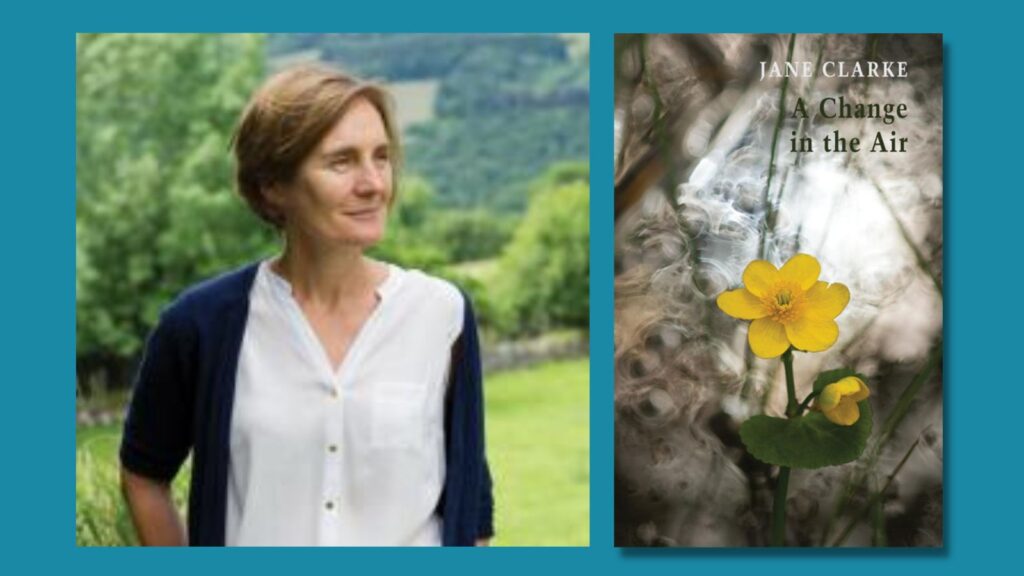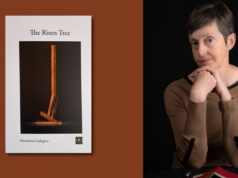
A Change in the Air|Jane Clarke|Bloodaxe|€13.45
Outstanding poems of place and heart—Eleanor Hooker on A Change in the Air, by Jane Clarke
by Eleanor Hooker
If, as the philosopher Simone Weil states, ‘attention is the rarest and purest form of generosity’, then it is certain the poems in Jane Clarke’s third collection, A Change in the Air (Bloodaxe Books), have achieved this effect with abundance.
The collection consists of fifty-five poems divided into six sequences. Each sequence has its own theme, ranging from quiet recollections of family and the poet’s early years on a farm, to the pit ponies and their minders at Glendasan mines, to the privations of the First World War, to outstanding lyrical poems of place and heart in the final sequences.

Passing into history
In the first sequence of the book, Clarke conjures an Ireland passing into history. The poems tell exclusively of the lives of women, of the poet’s relationship her with mother and grandmother; women who are also passing into history. In unsentimental poems and with great tenderness, Clarke attends to her mother’s decline. In a deeply personal way, she allows the reader to know or remember the terrible privilege of caring for a parent:
I am becoming mother
to my mother
[…]
I read my mother stories
till she falls asleep
to dream of her mother
coming to take her from me.
(from ‘Becoming: after Lorna Goodison’)
The most daily of tasks once undertaken by her mother, such as washing potatoes, assume a sacredness when described by the poet:
In her days of gathering dusk,
she clasps them under the pump
rinses till the water runs clean
(from ‘Butter for Queens’)
Or making raspberry jam –
Sunday morning stillness
in a thicket of canes
my mother reaches
for quilted berries
eases them red and willing
from yellow stalks
(from ‘Raspberries’)
In ‘The arch’, the concluding poem in this first sequence, Clarke describes the structure as a symbol of strength and support, a gateway to the past, but which, ultimately, becomes a metaphor for letting go.
Years it watched the courtyard walls
crumble and fall, till it was left alone.
When will it stop trying to hold
what can no longer be held?
(from ‘The Arch’)
Gesture and sound
In every book of poetry, one poem distinguishes itself and the poet by virtue of its brilliance and emotional intelligence. As the most achieved in the collection, ‘Pit Ponies of Glendasan’ is such a poem. It is truly exquisite. It also contains a line from which the book title is taken.
The poem tells of the connection, the loyalty and interdependence between miner and beast, as miners feed their pit ponies ‘windfall apples/comrades in toil’. Clarke uses the vernacular of gesture and sound to imaginatively recreate the going underground, or emerging from darkness from which the pit ponies might occasionally have to ‘deliver/injured men back to daylight’.
Hitched to an eight-hour shift
in britchens, hames and traces,
they follow the miners’ carbide lights,
halt under hoppers, turn
on a thruppence and lean into their collars
to pull the five-wagon train.
(from ‘Pit Ponies of Glendasan’)
Ghosts
Ghosts from the front lines of the First World War populate the poems in ‘When All This Is Over’, the third sequence in the collection. The poems chronicle the innocence of men and ‘lads’ leave-taking for the trenches and their growing realisation of the horrors of a war of attrition.
In the poem ‘In the dugout’ soldiers ‘play/the ‘when this is all over’ game’ but as the war progresses their plans become less ‘bold’ and more a yearning to ‘waltz with my wife in the kitchen//hold my mother’s hand/watch my children sleep’.
Bookended by domestic scenes, Clarke’s attention moves along the top of the trenches where she stops to listen as ‘Some men sing, some men chat’ or to observe men ‘digging since early/another twenty graves’. The first poem ‘September 1914’ describes how a family cope by occupying themselves in routine.
The week before he left for France
we leaned a ladder into the apple trees
picked Cox’s Orange Pippins,
Newton Wonders, Brownlee’s Russets
The narrator recalls how later ‘We sat out after dinner//and talked of how we loved/this time of year.’
In ‘Snow’, the penultimate poem in this section, the temperature drops as the cataclysmic results of war are delivered to one family. The speaker ‘could almost believe//that they haven’t received
His mud-caked kit, breeches ripped
From ankle to hip, bloodied tunic,
his helmet, slightly dinged,
and the watch he won at school.
The comma before ‘slightly dinged’ makes the reader pause to consider this catalogue of disaster. Clarke’s language requires no embellishment. Her descriptions suffice to show the speaker’s intense grief at the loss of whom, we assume, was her young son.

Emotional truth
The final section of the book, ‘We Could Say It Begins’, contains three sequences. As Clarke creates poems for her wife, Isobel, to whom the collection is dedicated, we gain insight into how a family and community come to accept that life is not a rehearsal; that love should be ‘enough to remind us/we’d already found what mattered’.
.
I practise saying Isobel is my wife
And it sings to the tune of my life
(from ‘Wife’)
In ‘Spalls’ the poet tells of her parent’s arrival to help ‘us grow a garden’, how she and her wife worked to her mother’s ‘bidding’ and how by evening her father had
built us a wall under the holly, held together
by gravity and friction, hearted with handfuls of spalls
Poets select every word with great care, so ‘gravity and friction’ followed by ‘hearted’ is a surprise and a joy to read, encompassing the entire lexicon of a parent-child relationship.
One of Clarke’s great gifts is to describe nature in language so fresh it repeatedly re-makes the world:
a spider trapped
on sundew tendrils
dragonflies skittish
from butterwort to asphodel
and a pair of low-flying merlin
wingbeat, wingbeat, glide
(from ‘Recipe for a Bog’)
Clarke’s poems are above all else accessible, and in being so, the poet honours her reader. She removes a language blind, bringing us to the beating heart of her work. A Change in the Air is a generous collection by a poet resolute but gentle in the matter of emotional truth.












